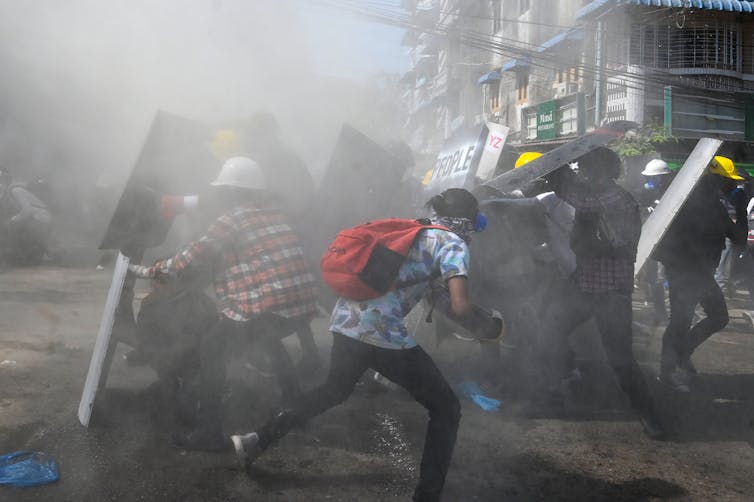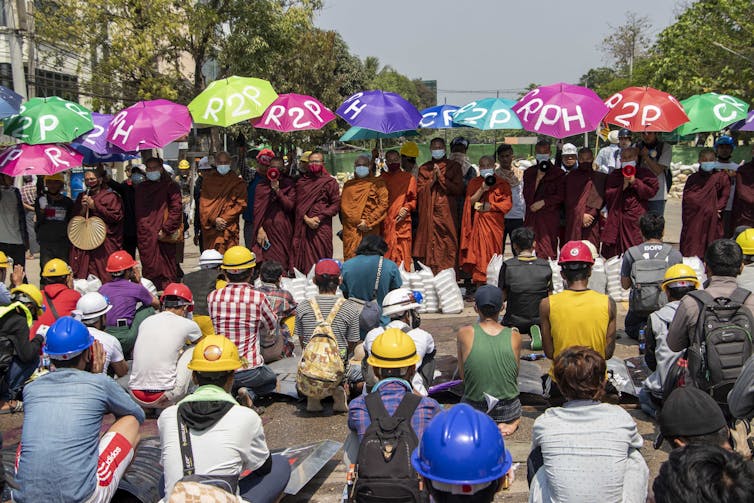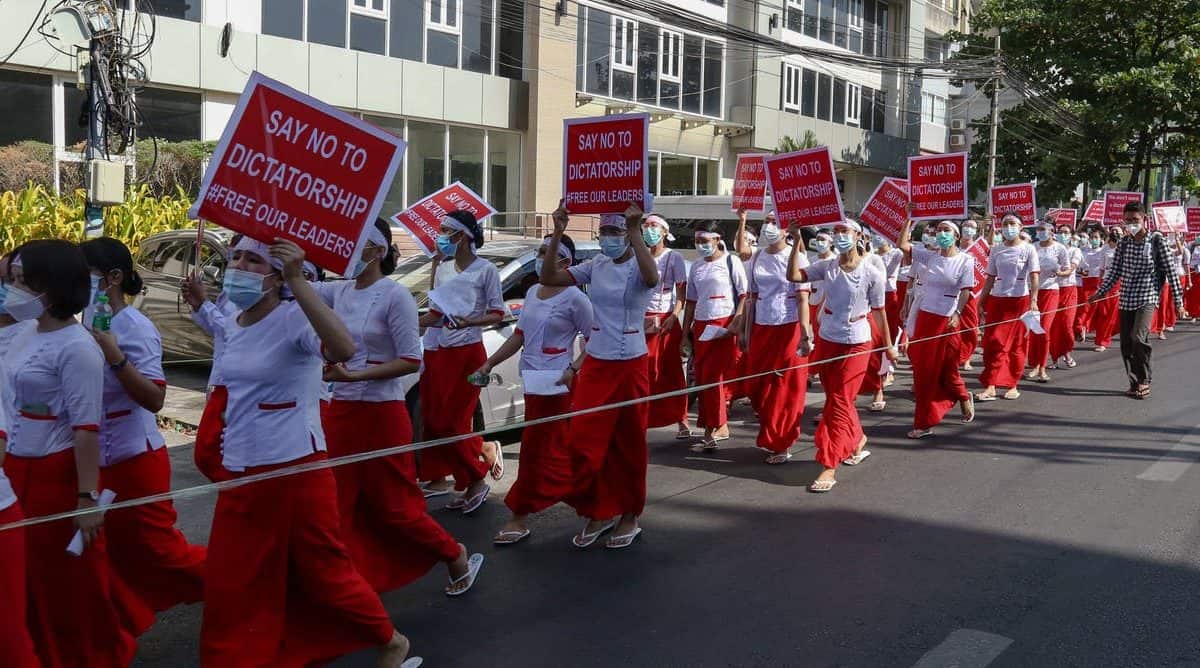Tharaphi Than, Northern Illinois University
Young people were the first in Myanmar to peacefully protest the country’s new military regime. Then came labor unions. In the weeks since a Feb. 1 military coup, Mynamar’s resistance movement has expanded dramatically to include some perhaps unlikely activists: doctors, nurses, bankers, grocers, railway workers and other working professionals risking their middle-class comforts.
Myanmar was under military rule from 1988 to 2011. During the elections in 2015, the National Democratic League won by a landslide, and party leader Aung San Suu Kyi, a well-known dissident, became the country’s leader. The army overthrew her government on Feb. 1, 2021, and imposed martial law.
Soon, thousands of Myanmar’s health care workers were refusing to go to work – an attempt to thwart the coup regime by grinding government machinery to a halt. Health care is public in Myanmar, and health workers hold 10% of all government jobs. Most hospitals and medical schools have closed their doors.
As elsewhere in the world, doctors and nurses in Myanmar have become public heroes during the pandemic. Their high social status makes them important allies to the pro-democracy cause.
Doctors and nurses are among many other civil servants in Myanmar to engage in civil disobedience. Up to 90% of the staff in some government ministries is on strike, according to a senior official at the Ministry of Electricity and Energy; the junta says it’s 30%. Some of Myamar’s 7.4 million private-sector workers are also striking, including bank employees, whose absence has forced the government to limit daily cash withdrawals.
A revolt started by young people raised during Myanmar’s democratic transition is becoming a broadly based national resistance movement involving the middle classes – whom history shows are central to any successful protests movement. And despite increasingly deadly military crackdowns beginning in early March, the protests are still gaining steam.

Money talks
I study social movements and dissent in Myanmar. Active support from the comfortable middle class differentiates current protests from previous pro-democracy movements in Myanmar, from the Buddhist monks’ “saffron revolution” against the military dictatorship in 2007 to student protests for education reform in 2015.
Those protests, which did not achieve their goals, were confined to one segment of the population. This time around, Generation Z is leading Myanmar’s pro-democracy uprising, and some of my university students from there were arrested in a March 3 crackdown and face up to three years in prison.
But the youth are joined by many other kinds of people. Some workers walked off their jobs to rally behind the young people at protests. Other middle-class professionals support the movement more quietly, with money, rations, shelter and professional services like legal advice.
People across Myanmar are also boycotting products produced by the army and its conglomerates, such as Myanmar beer and the Joox music app, and goods imported from China and Singapore – two top investors in Myanmar, neither of which condemned the coup.
After bank workers began to strike late last month, international observers worried banks in Myanmar would collapse. But banks serve very few people in Myanmar. As of 2017, only 6% of the Southeast Asian country’s 54 million people were served by a financial institution.
During the pandemic, which has hit Myanmar hard, nonprofit organizations mobilized to create small aid networks that could provide funds to poor people who needed cash using online sites and phone apps. About 1 million people in Myanmar used a phone-to-phone cash transfer service called Wave every month of last year.
Now, during the protests, those same aid networks are providing financial support to help striking civil servants and private-sector workers partially make up for their forgone salaries. Grocers provide rations to keep food on protesters’ tables. Medical professionals help those hurt in the protests and provide free health care to their families. Teachers provide free education.
Through new apps such as Stay away, people are scrutinizing how they spend their money to avoid unintentionally financing the army and its supporters, who have investments in nearly every sector of Myanmar’s economy, from supermarkets to entertainment.

Moral shaming
As protests grow, the military’s crackdowns are getting more and more brutal. As of March 15, more than 100 people had been killed and nearly 2,000 detained. Still, thousands of students and workers flood into the streets every day.
“Dhamma versus adhamma” is their slogan: “Justice versus injustice.”
To help the frontline activists, residents of neighborhoods surrounding the protest sites in Myanmar’s commercial capital, Yangon, build barricades and hide protesters from security forces. Businesses in the neighborhood of Sanchaung close between 9 a.m. and 3 p.m. for protests. Afterward, as trading and daily activities resume, neighbors clear the debris from clashes between security forces and protesters, then rebuild barricades for the next act of resistance.
When soldiers beat, shoot and kidnap protesters, people take videos and photos from nearby buildings and send them to media and to investigators at the United Nations.
All over the country, social shaming of regime leaders and their families is a tactic of resistance. In the town of Monywa, in central Myanmar, residents have been following family members of the security forces in the streets and asking local shopkeepers not to serve them as customers.
From striking students to online activists to no-show nurses to helpful neighbors, Myanmar’s protesters resist in different ways with a shared goal: to restore their country’s nascent democracy. With sustained massive resistance to the military and moral support from much of the nation, Myanmar’s peaceful demonstrations may contain the seeds of a revolution.
Tharaphi Than, Associate Professor, Department of World Cultures and Languages, Northern Illinois University
This article is republished from The Conversation under a Creative Commons license. Read the original article.












